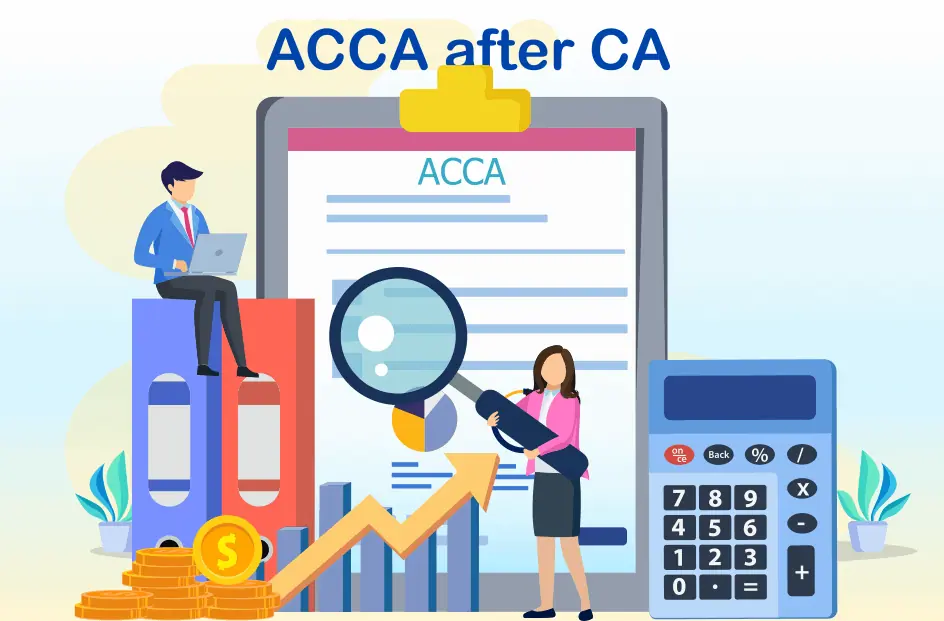ACCA vs CA is an interesting topic. Sometimes, deciding between the CA and the ACCA course isn’t very clear! Knowing your professional goals and comprehending the primary distinctions between the two educational certificates are essential to choosing the best decision. The primary distinction between the ACCA and CA is that the former opens doors to jobs abroad in the finance industry. In contrast, the latter only opens doors in India by giving you a thorough understanding of regional financial laws.
When comparing ACCA with CA, students frequently become perplexed. ACCA covers the global perspective of accounting and finance, whereas CA covers Indian standards of accounting and taxation. A few subjects overlap, such as taxation, auditing, accounts handling, management accounting, etc.
This article will explore the difference between CA (Chartered Accountancy) and ACCA (Association of Chartered Certified Accountants), or, we can say, ACCA vs CA. When deciding between the two, being aware of these differences can help you make an informed choice.
What is an ACCA course?
ACCA is a rapidly expanding worldwide accounting organization. Those who want to pursue careers in finance and accounting can apply for the Certification. The applicants for the Certification must pass the 12th grade. Its adaptable examination format adds to its popularity. Having an ACCA certification makes it simple to obtain employment abroad.
With more than 2,00,000 members and 4,86,000 students in 178 countries (that covers 92% of the planet!), the Association of Chartered Certified Accountants (ACCA) program is widely recognized. The largest professional accounting qualification in the world is the ACCA qualification. Many students who wish to pursue successful careers overseas choose to take the ACCA course, which is one of the most respected accounting certifications. The ACCA authority has also brought in over 7,400 approved employers and 80 accountancy partnerships globally.
What is a CA course?
The organization that administers the CA exams in India is called the ICAI. The ICAI ranks as the second-biggest accounting group globally. CA certification can get you High-paying positions in the finance sector. CAs have to go through an extensive curriculum and exams, it’s a tough certification. Like ACCAs, they must know corporation law, taxation, accounting, and auditing.
The esteemed CA degree, or chartered accountancy, confers accounting, taxation, and audit proficiency. In the Indian financial sector, it is highly regarded and in high demand. It has a position that guarantees clarity in legal and financial matters.
CAs frequently occupy important managerial roles, ensuring compliance and offering financial insights. Also in demand are CA grads since they must handle the complex interactions between Indian governments and corporations.
Difference between ACCA and CA courses
Let’s see ACCA vs CA on different specifics that can help you understand the difference between the two.
| Specifics | ACCA | CA |
| Name | Association of Chartered Certified Accountants | Chartered Accountants |
| Curriculum | Focuses on international accounting standards and procedures while discussing various subjects such as accounting, finance, taxation, audit and management subjects. The course allows the addition of extra papers according to professional interests. | A major emphasis is placed on Indian auditing and accounting standards that are unique to the nation where the course is being taken. The course covers financial management, audits, taxation, and other relevant topics. |
| Eligibility | Either Class 12 with commerce and a bachelor’s degree such as BBA, BCom, BMS | Minimum 10+2 |
| Total Fees | INR 2 to 3 Lakh | INR 1 Lakh |
| Signing Authority | ACCAs have signing authority in many countries, such as the United Kingdom, UAE, Switzerland, Australia, etc. But ACCA has no signing authority in India. | Chartered Accountants (CA) have signing authority in India, with ICAI having the sole signing authority. |
| Duration | 6-24 Months. | 4.5 Years |
| Difficulty | The wide range of subjects addressed and the global emphasis make it widely regarded as less difficult than CA demands in terms of self-study and commitment. | Especially in nations like India, it is renowned for its exacting standards and demanding curriculum. Tests are regarded as difficult, and pass rates can differ. |
| Syllabus | The 13 ACCA papers include business law, taxation, audit and assurance, financial management, management accounting, and business strategy and technology. Provides flexibility by allowing students to choose their optional papers according to their professional preferences. | CA consists of 4 papers for the Foundation Course, 8 for the Intermediate Course, and 8 for the Final Course. The subjects covered are accounting, auditing, taxation, corporate laws, financial management, cost accounting, and strategic management. |
Salaries and scopes of ACCA and CA
However, salary can not be a deciding factor between ACCA and CA. It’s good to know the difference between the two. Below are the details of the CA and ACCA salary
Salary of ACCA
Becoming a worldwide chartered accountant through the ACCA program offers several benefits. One such benefit is pay, among others. An ACCA affiliate’s beginning annual compensation in India may range from 4 to 10 lakhs. The pay rises by about 10 to 15 lakhs every year after you become an ACCA member. Due to the same skill sets required for both qualifications, the ACCA salary in India has surpassed the CA salary in some professions.
Salary of CA
The field of chartered accounting provides a good wage in addition to many options. In India, a person’s skill sets, expertise, and experience determine their chartered accountant compensation. About 8 to 9 lakhs is the typical annual income for a chartered accountant in India. Experienced CAs sometimes make much more, frequently between ₹10 lakh and ₹25 lakh annually, especially in top-tier organizations and international corporations. Newly certified CAs can normally expect starting wages ranging from ₹6 lakh to ₹10 lakh annually.
ACCA Scope in India
Candidates can find employment in India and outside in the following designations after earning an ACCA certification, which is currently on par with an Indian CA qualification. The career choices for ACCA are:
| Job Name | Salary |
| ACCA Trainee | INR. 3-5 Lakhs |
| Jr. Accountant | INR. 4-6 Lakhs |
| Accountant | INR. 5-8 Lakhs |
| Financial Analyst | INR. 8-12 Lakhs |
| Manager(Finance) | INR. 12-18 Lakhs |
| Finance Director | INR. 20 Lakhs |
CA Scope in India
A career in the finance and accounting departments is an option for holders of a CA certificate. In addition, they can be involved in financial strategy planning, managing pension funds and long-term investments, mergers and acquisitions, and controlling future investments. The following list includes several profiles they can work in.
| Job Name | Salary |
| Tax Manager | INR. 10-18 Lakhs |
| Finance Manager | INR. 10-18 Lakhs |
| Audit Manager | INR. 8-15 Lakhs |
| Risk Manager | INR. 10-18 Lakhs |
| Chief Financial Officer(CFO) | INR. 20-50 Lakhs |
Is ACCA better than CA?
We say both are equal to each other. CA and ACCA differentiate in certain areas with their benefits. The international organization for accounting and finance professionals is ACCA or the Association of Chartered Certified Accountants. It seeks to provide first-choice, business-relevant credentials to individuals with aptitude, ambition, and application from all over the world who want to pursue fulfilling careers in management, finance, and accounting. It is the entry point to accountancy that is expanding the fastest in the world, assisting individuals just like you in becoming prosperous accountants and finance specialists.
The ACCA certification is new in India compared to CA. The ACCA credential and the CA (ICAI) certification are somewhat equivalent in India. But it’s too hard to pass the CA qualification. If you want to work for an Indian company, launch your venture, or become a partner in a CA firm, you must have a CA qualification. Indian chartered accountants have an edge over ACCA in India since they know the country’s laws, taxes, regulations, and other aspects of the Indian economy.
Similarly, an ACCA qualification becomes mandatory if you want to work overseas or at an MNC in India. ACCA career prospects exist in Singapore, Dubai, the UK, Australia, and other countries.
Conclusion
The two most sought-after accounting credentials were contrasted in our blog post. We discussed the curriculum, fees, and employment prospects, and some main distinctions between ACCA and CA. You are responsible for choosing the Certification that best meets your future goals and professional aspirations.
Due to their technical proficiency, strategic thinking, and professional ethics, ACCAs are highly sought-after professionals worldwide. Demand for ACCA experts has increased over the years and will continue. Those with ACCA qualifications are employed by more than 7000 employers globally, including 90% of Fortune 500 businesses.
Due to ACCA’s widespread recognition, many jobs are available domestically in India and abroad. Through ACCA’s global reach, professionals can investigate employment opportunities in multinational organizations and global firms, taking advantage of their talents and qualifications on a larger scale.
Thus, obtaining both CA and ACCA certifications offers a strong career path that offers increased flexibility, international mobility, and job opportunities in the fast-paced accounting and finance industry.
We hope we describe ACCA vs CA in detail. We recommend you check individual courses to understand more about them.
If you are studying or passed 12th Commerce we highly recommend you check the below article
Best Courses After 12th Commerce for Crafting a Successful Career




